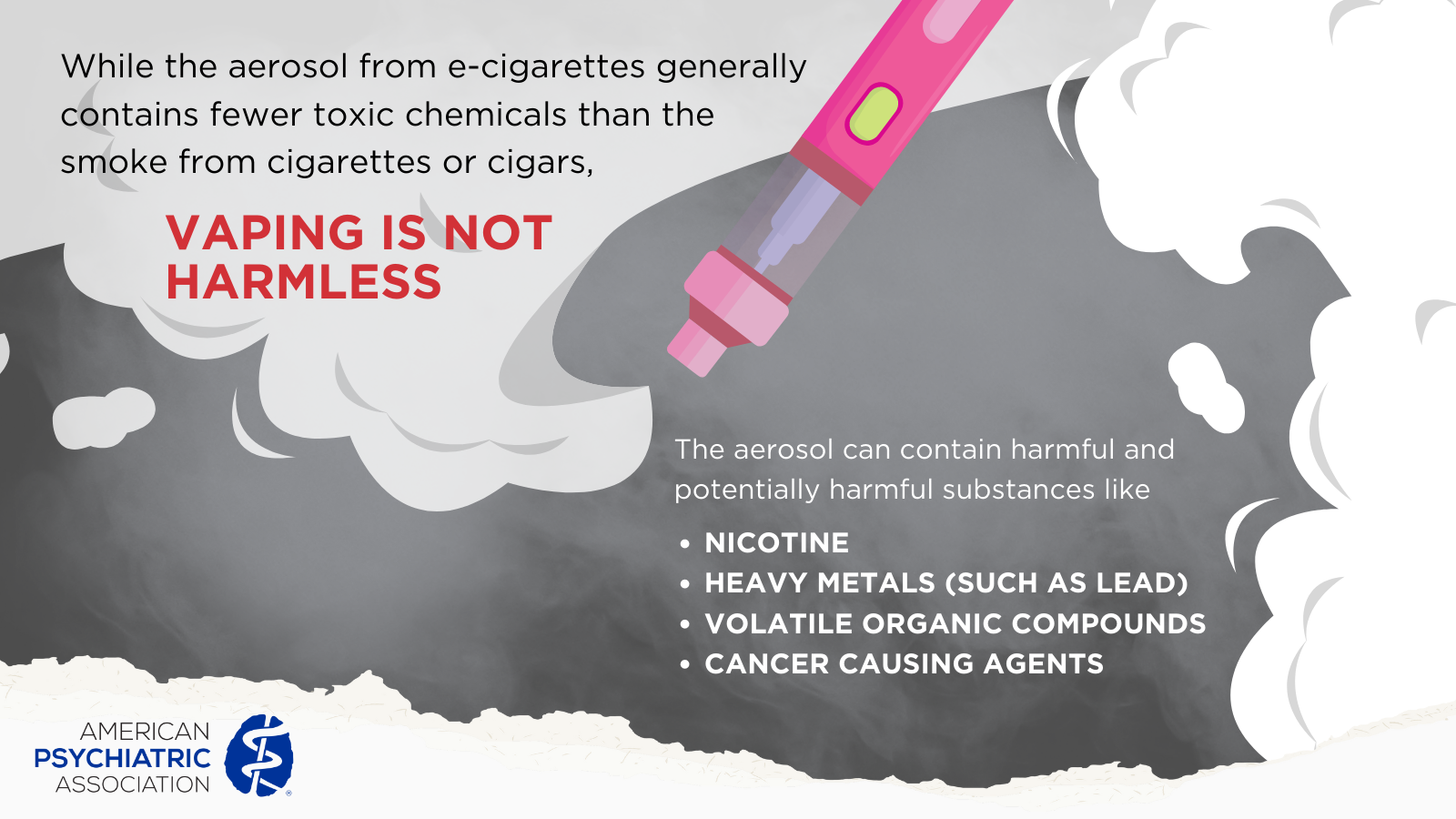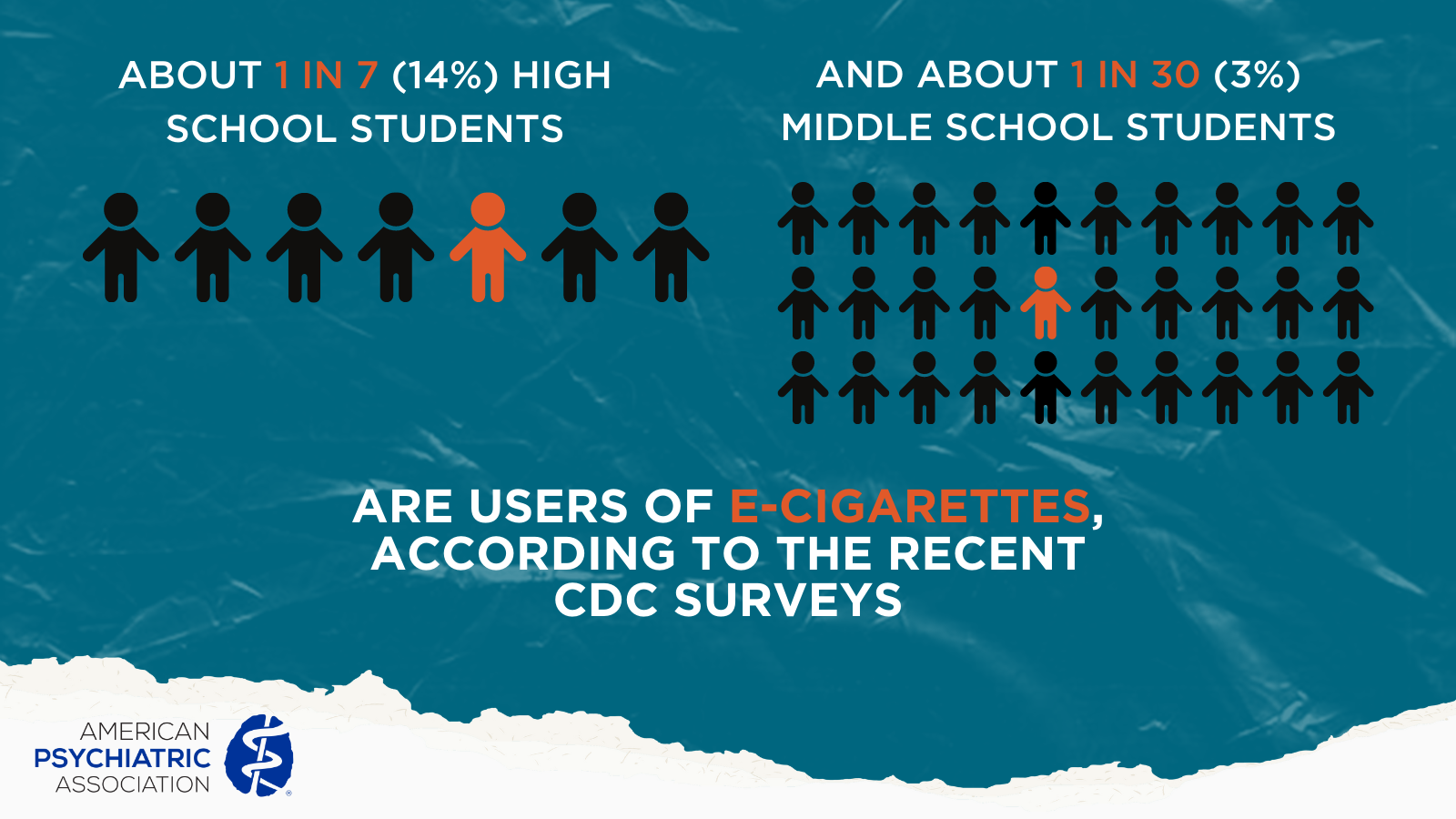Vaping is Unhealthy. Tips and Resources to Help Quit.
Electronic (e-) cigarettes, or vaping devices, were first introduced to adults in the early 2000s as a potential smoking cessation aid. They gained popularity due to their perceived reduced harm compared to traditional cigarettes. The devices often resemble traditional tobacco cigarettes (cig-a-likes), cigars, or pipes, as well as pens and USB memory sticks. Users inhale an aerosol (vapor), containing nicotine or marijuana/THC, flavorings, and other chemicals. E-cigarettes have evolved over time, with newer devices offering higher nicotine concentrations and customizable flavors.
While more than 460 different e-cigarette brands are currently on the market,1 by 2017 JUUL accounted for approximately 75% of e-cigarettes sold. According to the manufacturer, a single JUUL pod contains as much nicotine as a pack of 20 regular cigarettes.
Health and Mental Health Risks of Vaping

Nicotine, a highly addictive substance, stimulates the adrenal glands to release epinephrine (adrenaline) and increases the levels of dopamine, a chemical messenger in the brain. Pleasure caused by nicotine’s interaction with the brain’s reward system motivates some people to use nicotine continuously, despite risks to their health and well-being. Using nicotine in adolescence may increase risk for future addiction to other drugs, as well as harm the parts of the brain that control attention, learning, mood, and impulse control. Approximately two-thirds of JUUL users aged 15 to 24 do not know that JUUL always contains nicotine.2
The primary physical health impact associated with vaping is lung injury. Vaping-related lung injuries have been reported to lead to severe respiratory symptoms, including coughing, shortness of breath, and chest pain. It is important for individuals experiencing respiratory symptoms after vaping to seek medical help promptly. E-cigarette use may increase the risk of cardiovascular problems, such as heart attacks and strokes as well as other health risks at the same level as smoking cigarettes.3
Marketing to Teens
The use of e-cigarettes among adolescents and young adults has been declared an epidemic in the US.4 The appeal of flavors, aggressive marketing tactics, lower per-use cost compared to cigarettes, less noticeable smell and smoke, and the perception of reduced harm have contributed to the uptake of vaping among youth. JUUL gained significant popularity, particularly among young people, due to its sleek design and flavored nicotine pods. The company faced increasing criticism for allegedly targeting teenagers through social media campaigns and youth-oriented advertising.
In late 2018, the FDA issued warning letters to JUUL Labs and several other e-cigarette manufacturers stating that they were not doing enough to address the youth vaping epidemic. Several states filed lawsuits against JUUL Labs alleging that the company's marketing practices violated state laws by targeting minors and downplaying the risks associated with e-cigarette use. Additionally, various school districts and individuals filed lawsuits against JUUL, seeking damages for addiction and health issues allegedly caused by JUUL products.
In September 2019, the company reached a settlement with North Carolina Attorney General Josh Stein requiring JUUL to pay $40 million over six years to fund youth vaping prevention programs. It also imposed marketing and sales restrictions in the state Mounting pressure from regulators and public health officials concerned about the appeal of flavored nicotine pods compelled JUUL to announce in October 2019 that it would stop selling its flavored pods with the exception of menthol and tobacco.
In early 2022 the FDA ordered the company to stop selling its vaping products, but upon appeal placed a temporary hold on its order in July of the same year. On April 12, 2023, JUUL reached a $462 million settlement with states including New York and California, ending allegations that JUUL targeted young consumers with its marketing. In total, JUUL had reached settlements with 47 states and territories and 5,000 individuals and local governments.
Getting Help for Nicotine Addiction
Many strategies exist to quit vaping.
- Nicotine replacement therapies, such as nicotine patches or gum, can help manage withdrawal symptoms.
- Behavioral counseling and support groups can also be beneficial in overcoming addiction to vaping.
- Medications are available to help with quitting (bupropion (Wellbutrin) and varenicline (Chantix) are FDA-approved)
- Help is available by calling 1-800-QUIT-NOW or 1-877-44U-QUIT to talk with a tobacco cessation counselor.
- The National Cancer Institute provides a chat online service at LiveHelp or by texting QUIT to 47848.
Physicians and other health care professionals must make it a priority to identify patients who vape or smoke, reinforce the benefits of quitting, and provide them with access to smoking /vaping cessation programs.
Learn more about e-cigarettes and vaping.

References
- E-Cigarette Use Among Youth and Young Adults: A Report of the Surgeon General 2016. U.S. Department of Health and Human Services.
- Quick Facts on the Risks of E-cigarettes for Kids, Teens, and Young Adults. Centers for Disease Control and Prevention.
- Smoking both traditional and e-cigarettes may carry same heart risks as cigarettes alone. 2022. American Heart Association News
- Helgertz S, Kingsbury J. Teens Less Susceptible to Vaping When Restricted to Tobacco-Flavored E-cigarettes: Implications for Flavored Tobacco Policies. Nicotine & Tobacco Research, Volume 25, Issue 5, May 2023, Pages 991–995.
